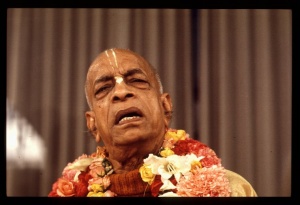SB 10.52.30: Difference between revisions
m (1 revision(s)) |
No edit summary |
||
| Line 1: | Line 1: | ||
{{info | {{info | ||
|speaker=Lord | |speaker=Lord Kṛṣṇa the Supreme Personality of Godhead | ||
|listener= | |listener=brāhmaṇa messenger | ||
}} | }} | ||
[[Category:Srimad-Bhagavatam - Canto 10 Chapter 52]] | |||
[[Category:Bhagavatam Verses Spoken by Lord Krsna - Vanisource|105230]] | |||
<div style="float:left">'''[[Srimad-Bhagavatam]] - [[SB 10|Tenth Canto]] - [[SB 10.52: Rukmini's Message to Lord Krsna|Chapter 52: Rukmiṇī's Message to Lord Kṛṣṇa]]'''</div> | |||
<div style="float:right">[[File:Go-previous.png|link=SB 10.52.29]] '''[[SB 10.52.29]] - [[SB 10.52.31]]''' [[File:Go-next.png|link=SB 10.52.31]]</div> | |||
{{RandomImage}} | |||
{{SBnotice}} | |||
==== TEXT 30 ==== | ==== TEXT 30 ==== | ||
<div | <div class="verse"> | ||
kaccid dvija-vara-śreṣṭha | :kaccid dvija-vara-śreṣṭha | ||
dharmas te vṛddha-sammataḥ | :dharmas te vṛddha-sammataḥ | ||
vartate nāti-kṛcchreṇa | :vartate nāti-kṛcchreṇa | ||
santuṣṭa-manasaḥ sadā | :santuṣṭa-manasaḥ sadā | ||
</div> | </div> | ||
| Line 17: | Line 22: | ||
==== SYNONYMS ==== | ==== SYNONYMS ==== | ||
<div | <div class="synonyms"> | ||
''kaccit''—whether; ''dvija''—of the ''brāhmaṇas''; ''vara''—first-class; ''śreṣṭha''—O best; ''dharmaḥ''—religious principles; ''te''—your; ''vṛddha''—by senior authorities; ''sammataḥ''—sanctioned; ''vartate''—are proceeding; ''na''—not; ''ati''—too much; ''kṛcchreṇa''—with difficulty; ''santuṣṭa''—fully satisfied; ''manasaḥ''—whose mind; ''sadā''—always. | |||
</div> | </div> | ||
{{SBcollapse}} | |||
==== TRANSLATION ==== | ==== TRANSLATION ==== | ||
<div | <div class="translation"> | ||
[The Supreme Lord said:] O best of exalted brāhmaṇas, are your religious practices, sanctioned by senior authorities, proceeding without great difficulty? Is your mind always fully satisfied? | [The Supreme Lord said:] O best of exalted brāhmaṇas, are your religious practices, sanctioned by senior authorities, proceeding without great difficulty? Is your mind always fully satisfied? | ||
</div> | </div> | ||
| Line 31: | Line 36: | ||
==== PURPORT ==== | ==== PURPORT ==== | ||
<div | <div class="purport"> | ||
Here we have translated the word dharma as "religious practice," although this does not fully convey the Sanskrit sense of the word. Kṛṣṇa did not appear within a secular society. The people in Vedic times could hardly imagine a society that did not understand the need to obey God's law. Thus to them the word dharma conveyed a sense of duty in general, higher principles, prescribed duty and so on. It was automatically understood that such duties were within a religious context. But religion in those days was not a specific aspect or department of life, but rather a guiding light for all activities. Irreligious life was considered demoniac, and God's hand was seen in everything. | Here we have translated the word ''dharma'' as "religious practice," although this does not fully convey the Sanskrit sense of the word. Kṛṣṇa did not appear within a secular society. The people in Vedic times could hardly imagine a society that did not understand the need to obey God's law. Thus to them the word ''dharma'' conveyed a sense of duty in general, higher principles, prescribed duty and so on. It was automatically understood that such duties were within a religious context. But religion in those days was not a specific aspect or department of life, but rather a guiding light for all activities. Irreligious life was considered demoniac, and God's hand was seen in everything. | ||
</div> | </div> | ||
__NOTOC__ | </div> | ||
</div> | |||
<div style="float:right">[[File:Go-previous.png|link=SB 10.52.29]] '''[[SB 10.52.29]] - [[SB 10.52.31]]''' [[File:Go-next.png|link=SB 10.52.31]]</div> | |||
__NOTOC__ | |||
__NOEDITSECTION__ | |||
Revision as of 08:02, 24 May 2021

A.C. Bhaktivedanta Swami Prabhupada
Please note: The synonyms, translation and purport of this verse were composed by disciples of Śrīla Prabhupāda
TEXT 30
- kaccid dvija-vara-śreṣṭha
- dharmas te vṛddha-sammataḥ
- vartate nāti-kṛcchreṇa
- santuṣṭa-manasaḥ sadā
SYNONYMS
kaccit—whether; dvija—of the brāhmaṇas; vara—first-class; śreṣṭha—O best; dharmaḥ—religious principles; te—your; vṛddha—by senior authorities; sammataḥ—sanctioned; vartate—are proceeding; na—not; ati—too much; kṛcchreṇa—with difficulty; santuṣṭa—fully satisfied; manasaḥ—whose mind; sadā—always.
Translation and purport composed by disciples of Śrīla Prabhupāda
TRANSLATION
[The Supreme Lord said:] O best of exalted brāhmaṇas, are your religious practices, sanctioned by senior authorities, proceeding without great difficulty? Is your mind always fully satisfied?
PURPORT
Here we have translated the word dharma as "religious practice," although this does not fully convey the Sanskrit sense of the word. Kṛṣṇa did not appear within a secular society. The people in Vedic times could hardly imagine a society that did not understand the need to obey God's law. Thus to them the word dharma conveyed a sense of duty in general, higher principles, prescribed duty and so on. It was automatically understood that such duties were within a religious context. But religion in those days was not a specific aspect or department of life, but rather a guiding light for all activities. Irreligious life was considered demoniac, and God's hand was seen in everything.